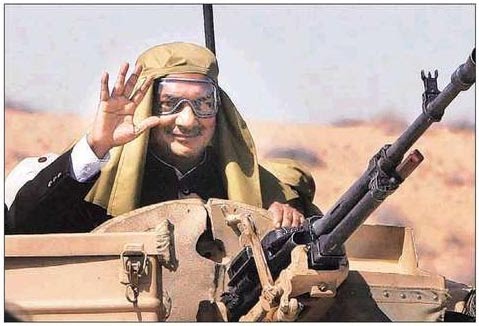
Defense Minister AK Antony drives one of the T-72s which remains blind at night due to Ministry of Defense supply failures. Is the Congress Party starting to realize that Antony has to go?
by Ajai Shukla
Defence News of India, February 23, 2010
Sarojini Naidu remarked that it cost India millions to keep Gandhi poor. It is harder to determine what this country is paying to perpetuate Defense Minister AK Antony’s reputation for honesty, but the only pecuniary penalty is thousands of crores a year.
Here’s how it adds up. Antony’s obsessive quest for the purchase of spotless weapons delayed the acquisition of artillery and anti-aircraft guns, fighters, submarines, night fighting equipment and a host of equipment upgrades. With arms inflation running at 15% a year, a five-year delay means India is paying double what it should have. And when that equipment is procured through government-to-government purchases and other sole-source contracts, the cost is about 25% more than it would have been under competitive bidding. Cautiously estimating that the delays affect only half of the Defense Ministry’s Rs 50,000 crore procurement budget, India is buying Rs 25,000 crore of weapons for 125% more than it would have had to pay.
Beyond that figure is the cost to national prestige and the devaluation of India’s military deterrence when – as following the 26/11 terrorist strikes in Mumbai – India’s armed forces are not prepared for immediate strikes. It happened under the supervision of Antoine.
To awkward questions about supply delays, Antony says “India is a democracy” and “we need to ensure full transparency”. Point out to him that many democracies handle timely procurement in a transparent way, and you’ll get a condescending, “Don’t worry, we’re doing whatever it takes to protect the country’s security.” »
After five years of insensitivity to Antony’s disastrous tutelage at the Ministry of Defense (MoD), the Congress party seems to realize that in India’s deteriorating security environment, Antony’s operation could leave the party having to account for a military embarrassment. Last week, Congress party spokesman Manish Tewari wrote an opinion piece in a national daily, arguing for all the changes Antony has steadfastly blocked during his disastrous five years in office.
Tewari called for “visionary reforms”; treat India’s private industry on an equal footing with the public sector; and “drastically reorganize” the Department of Defense Production. Although labeled as a personal opinion, the article represented a growing opinion within the Congress party.
Is it fair, Antoine’s defenders will ask, to put the blame entirely on him? After all, George Fernandes had publicly said that fear of the three Cs – the CAG, the CVC and the CBI – prevented MoD bureaucrats from making decisions. But Antoine, like no defense minister before him, endangers national security with his otherwise laudable fetish for probity. The message coming out of Antony’s office and infiltrating the purchasing department is: cancel a purchase in progress at the first suspicion of irregularity. Never mind that the suspicion was sown by a rival arms dealer; a paid parliamentary question; or a letter from an MP that was clearly dictated by someone who has all the details of the tender in question. Simply put the process on hold indefinitely.
A Department of Defense official asked me: Name an official who was punished for delaying the purchase of even the most vital equipment. But if I’m seen moving a file quickly, the defense minister’s office will ask, “What’s in a hurry.” It almost seems like you have a stake in this deal.
Then there is Antony’s obvious bewilderment at the technical problems of the military, an overwhelming ignorance that cannot be tolerated by India’s top military decision-maker. Apologists for Antoine cite his preoccupation with party business; but this is hardly convincing. His predecessor, Pranab Mukherjee, who had an infinitely greater role in party and national affairs, managed the MoD with skill and knowledge.
Over lunch three years ago, I asked Australia’s Minister of Defense why his air force was buying F/A-18F Super Hornet fighters when Australia was already in line for the futuristic F-35 Joint Strike Fighter, which was almost complete. His response: Australia’s aging F-111 fighters would retire in 2010; as the F-35 project was a few years behind schedule, 24 new Super Hornets would be inducted to retain Australian capability. (The Super Hornets are coming to Australia next month.)
Contrast this urgency with Antony’s “we will consider” approach, even though India faces a greater risk of military confrontation with Pakistan or China than Australia does with New Zealand or Papua and New Guinea.
Antoine’s personal image and goals harm national security and the image of his party. If adjusting electoral seats and managing dissent at the state level are his special skills, let him leave that crucial corner office in the South Block and give him a place in the congressional party office.
Mr Anthony?






